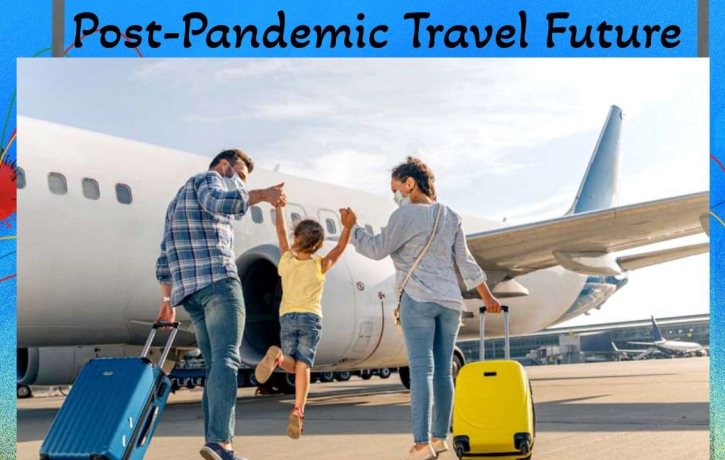- 1 The Future of Travel and Tourism in a Post-Pandemic World
- 2 1. Health, Hygiene, and Trust Will Define Travel Choices
- 3 2. The Rise of Remote Work and Workations
- 4 3. Domestic and Regional Travel Take the Lead
- 5 4. Sustainable Travel Becomes a Priority
- 6 5. Technology Will Power Seamless Travel
- 7 6. Flexibility and Agility Are Non-Negotiable
- 8 7. Reimagined Experiences and Meaningful Travel
- 9 8. The Role of Government and Global Coordination
- 10 Conclusion: A More Thoughtful Era of Travel
The Future of Travel and Tourism in a Post-Pandemic World
Post-Pandemic Travel Future. The COVID-19 pandemic brought the global travel industry to a standstill, shaking the foundations of how people move across borders, connect cultures, and experience the world. Airlines were grounded, cruise ships docked, borders closed, and tourism-dependent economies plunged into crisis. As we step into a post-pandemic era, the travel landscape is transforming—not just in logistics and safety protocols, but in mindset, behavior, and expectations.
This article examines the emerging trends and long-term shifts that are shaping the future of travel in a post-pandemic world.
1. Health, Hygiene, and Trust Will Define Travel Choices
Post-Pandemic Travel Future. Health and safety have become the foremost concerns for travelers. COVID-19 made hygiene practices more visible and non-negotiable, and this trend is here to stay. Travelers now expect:
-
Enhanced sanitation in hotels, planes, and public spaces.
-
Touchless technology for check-ins, payments, and boarding.
-
Health documentation, such as vaccine passports or negative COVID tests.
-
Travel insurance that covers pandemics and medical emergencies.
Airlines and hospitality providers that clearly communicate their health protocols are more likely to win consumer trust. Biometric identification, AI health monitoring, and advanced air filtration are becoming the norm in airports and aircraft.
2. The Rise of Remote Work and Workations
The pandemic ushered in a remote work revolution, unshackling employees from their offices. This shift has given birth to the “workation” trend—traveling while working remotely.
-
Digital nomad visas have been introduced by countries like Estonia, Barbados, and Costa Rica to attract long-stay visitors.
-
Co-living and co-working spaces are growing in popularity in locations like Bali, Lisbon, and Mexico City.
-
Travelers seek destinations with high-speed internet, safety, healthcare, and vibrant expat communities.
This blending of work and leisure means travel is no longer confined to short vacations but can become a lifestyle choice.
3. Domestic and Regional Travel Take the Lead
With international travel bans and uncertainty, many rediscovered the beauty of their home countries. Domestic tourism boomed during the pandemic and is likely to remain a strong segment due to:
-
Lower costs and fewer risks associated with local travel.
-
Easier access and familiarity with health infrastructure.
-
A growing appreciation for hidden gems, such as national parks, heritage towns, and off-the-beaten-path destinations.
Additionally, regional travel bubbles—agreements between neighboring countries for free movement—have emerged as a model to safely restart international travel.
4. Sustainable Travel Becomes a Priority
The temporary pause in travel allowed the planet to breathe—clearer skies, cleaner beaches, and wildlife returning to natural habitats. This reset brought sustainability to the forefront of travel conversations.
Travelers are now more inclined to:
-
Choose eco-friendly accommodations and tour operators.
-
Offset their carbon emissions from flights.
-
Support local artisans, guides, and businesses.
-
Avoid overtouristed destinations in favor of quieter, greener alternatives.
Governments and companies are also pushing for greener practices, from electric transportation to zero-waste hotels.
5. Technology Will Power Seamless Travel
Innovation has accelerated as the industry adapts to new realities. From planning to arrival, the future of travel is becoming increasingly digital:
-
Contactless payments and biometrics reduce physical interaction.
-
AI-powered assistants help with itinerary planning and customer service.
-
Virtual and augmented reality allow travelers to preview destinations.
-
Smartphone apps now serve as health passes, boarding documents, and translation tools.
The integration of blockchain, 5G, and big data will continue to streamline travel experiences and increase personalization.
6. Flexibility and Agility Are Non-Negotiable
Travelers are now conditioned to expect the unexpected—border closures, flight changes, or new variants. As a result, flexibility is a critical demand:
-
Airlines and hotels are offering flexible booking and cancellation policies.
-
Travel insurance packages are expanding to include pandemic-related disruptions.
-
Travelers prefer smaller group tours, private rentals, and off-peak travel to minimize risks.
The ability to pivot plans is no longer a luxury—it’s essential.
7. Reimagined Experiences and Meaningful Travel
The pandemic inspired introspection. Travelers now seek more than just leisure—they want meaning, connection, and transformation.
-
There’s growing interest in cultural immersion, volunteer tourism, and slow travel.
-
People are traveling to reconnect with family and friends, especially after long separations.
-
The focus is shifting from quantity to quality—fewer trips, but deeper experiences.
Luxury travel, too, is evolving to emphasize privacy, wellness, and personalization, rather than extravagance alone.
8. The Role of Government and Global Coordination
For travel to thrive post-pandemic, global coordination is vital. Governments, international health organizations, and the private sector must collaborate to:
-
Standardize health regulations and vaccine certifications.
-
Improve crisis response infrastructure at airports and border crossings.
-
Promote safe tourism campaigns that encourage responsible behavior.
Striking a balance between health security and freedom of movement will define policymaking in this sector for years to come.
Conclusion: A More Thoughtful Era of Travel
Post-Pandemic Travel Future has forever changed the way we travel—not just the logistics, but the purpose. We are entering a more thoughtful, intentional, and resilient era of global mobility. Whether it’s exploring nearby towns, working remotely from tropical islands, or embarking on once-in-a-lifetime adventures, travel in the post-pandemic world is rooted in connection, consciousness, and care.
The industry is still healing, but with innovation, sustainability, and empathy at its core, the future of travel looks not only possible—but promising.








